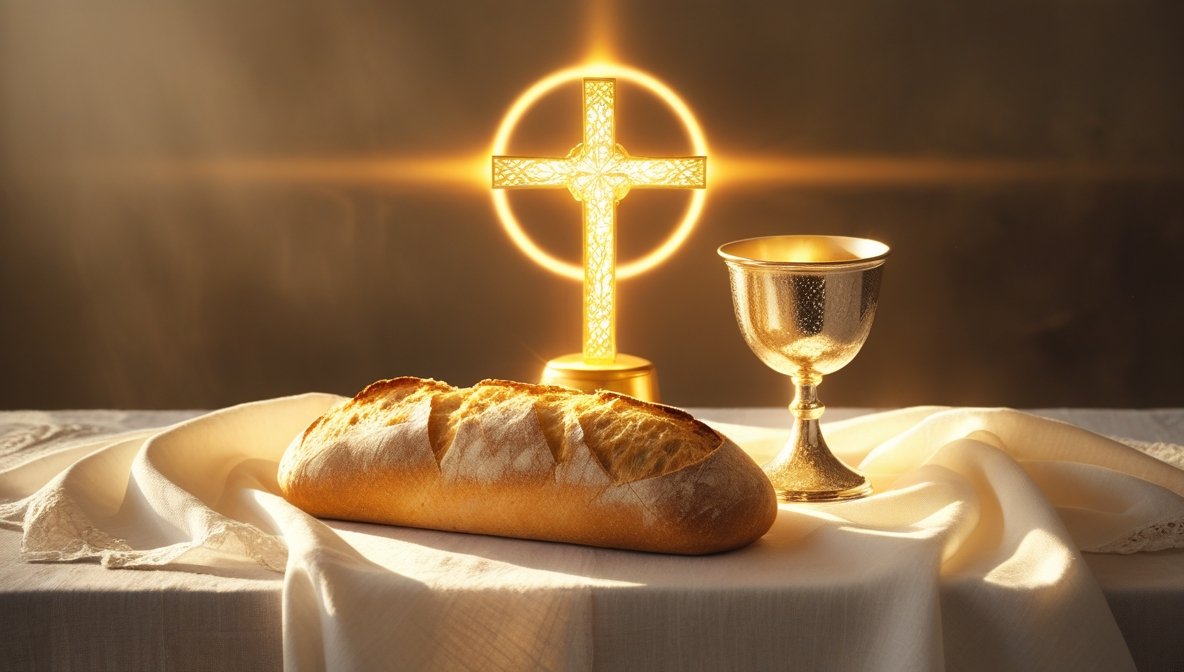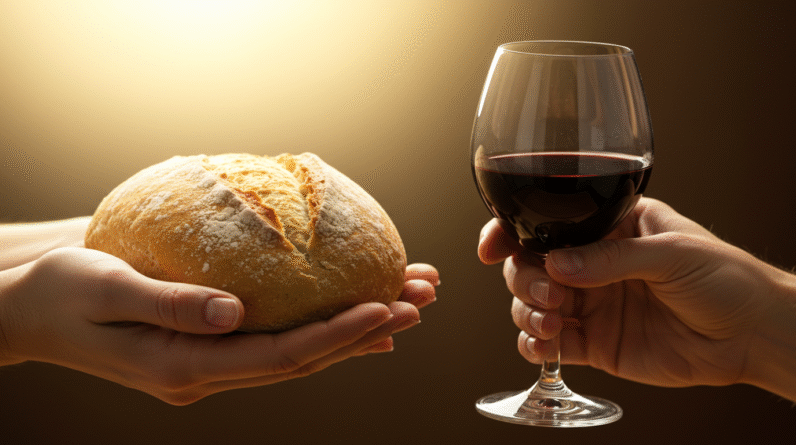How Communion Strengthens Your Faith
Communion is more than a ritual or a moment in a worship service. For you, Communion and faith are intertwined: the meal Jesus gave you becomes a regular touchpoint that renews your trust, shapes your identity, and deepens your gratitude. This article will walk you through why Communion matters, what the Bible says about it, and practical ways it can strengthen your faith in everyday life.
What Communion Is and Why It Matters to You
Communion — also called the Lord’s Supper or Eucharist in different traditions — is a symbolic meal Jesus instituted with his disciples that points to his body and blood sacrificed for you. When you take the bread and the cup, you are participating in a practice that has been at the heart of Christian life since the earliest church. Communion and faith belong together because the act reminds you of what Christ did and invites you into an ongoing relationship with him.
The Biblical Foundation of Communion
The primary accounts of the institution of Communion are found in the Gospels and in Paul’s letters. Jesus took bread, gave thanks, broke it, and said, “This is my body given for you; do this in remembrance of me” Luke 22:19. Paul gives the theological and pastoral perspective in his letter to the Corinthians: “For whenever you eat this bread and drink this cup, you proclaim the Lord’s death until he comes” 1 Corinthians 11:26. Those passages anchor Communion historically and spiritually — it’s a command, a remembrance, and a proclamation all at once.
Communion as Remembrance
When Jesus said “Do this in remembrance of me,” he wasn’t asking you simply to think about facts. The word remember in the Biblical context involves active, covenantal recall — calling to mind a relationship and its promises. Each time you participate in Communion, you intentionally remember Christ’s sacrifice, his love that paid the penalty for sin, and the new covenant that invites you into life. This ritualized remembrance helps you resist forgetfulness, which is a real threat in a busy, distracted life. The regular practice rewires your heart to keep the gospel at the center of your story.
Communion as Proclamation of the Gospel
Communion isn’t private nostalgia; it’s a public proclamation. Paul’s words make this clear: “Whenever you eat this bread and drink this cup, you proclaim the Lord’s death until he comes” 1 Corinthians 11:26. When you take Communion, you testify — to yourself and to others — that Jesus’ death and resurrection are the foundation of hope. The act is a bold declaration that your life is grounded in the gospel, which strengthens your faith by keeping the core truth visible and vocal in your worship life.
Communion Reminds You of Christ’s Sacrifice
The elements of Communion — bread and cup — are tangible reminders of the cost of your salvation. Jesus broke the bread and said it was his body; he offered the cup as his blood poured out for many Matthew 26:26-28. That tangible symbolism helps you grasp the reality of atonement. It’s one thing to assent intellectually that Jesus died for you; it’s another to hold a piece of bread or a cup of juice and let your senses participate in remembering what he endured on your behalf. That sensory engagement makes the gospel less abstract and more personally meaningful, and that deepens your faith.
Communion Strengthens Your Sense of Gratitude
Communion and faith are closely linked through gratitude. The Greek word for thanksgiving — eucharistia — is at the heart of the Lord’s Supper. When Jesus gave thanks over the bread and cup, he modeled worshipful gratitude for you to emulate Luke 22:19. Regularly participating in Communion trains you to approach life with a posture of thanksgiving. Gratitude shifts your focus from scarcity and fear to appreciation and trust, and a grateful heart is fertile soil for faith to grow.
Communion and Spiritual Nourishment
Jesus often used eating and drinking imagery to describe spiritual life. He told his followers that his flesh and blood are true spiritual food and drink that sustain real life John 6:53-58. While Communion is symbolic rather than a literal means of salvation, it symbolizes the deep spiritual nourishment Christ provides. When you take the elements in faith, you’re reminded to look to Christ as your ultimate sustenance — the one who satisfies your deepest longings. In seasons of hunger or spiritual drought, Communion can recalibrate your soul toward Christ as life and provider.
Communion and Community: You Are Not Alone
Communion is both personal and communal. The early church devoted itself to fellowship and the breaking of bread together Acts 2:42. When you share Communion with your church, you participate in a practice that binds believers together. That shared meal is a powerful expression of unity and mutual dependence: you need the body of Christ, and the body needs you. Communion and faith grow stronger when they’re embedded in community, because your belief is encouraged by the faithful witness and prayers of others.
Communion Breaks Down Divisions
Communion signals unity across differences. Paul rebuked the Corinthians for divisions and encouraged a discerning, loving posture when partaking 1 Corinthians 11:17-34. When you approach Communion with humility and reconciliation, it becomes a means of healing and a statement that Christ’s body transcends ethnic, social, and cultural divisions. This communal expression of unity strengthens your faith by reminding you that you belong to a people larger than yourself.
Communion and Repentance: Preparing Your Heart
Paul warns believers to examine themselves before eating and drinking so they don’t eat and drink judgment on themselves 1 Corinthians 11:28-29. That call to self-examination is not meant to create scrupulosity but to invite honest repentance. Communion offers a regular rhythm for confession — a built-in spiritual checkpoint for you to name sin, receive forgiveness, and be restored. The cycle of repentance and restoration reinforces your trust in God’s mercy and helps your faith stay honest rather than performative.
Communion and the Promise of Future Hope
Communion looks backward to Christ’s death and forward to his return. Jesus tied the cup to the promise of the new covenant and the hope of fulfillment when he comes again Luke 22:20. Paul frames the Lord’s Supper as a proclamation “until he comes” 1 Corinthians 11:26. Every time you take Communion, you receive a small foretaste of the coming banquet — a tangible reminder that your faith is headed toward a future consummation. This eschatological dimension keeps your faith hopeful, orienting your life toward God’s promised future.
Communion as a Means of Grace
Different traditions use the phrase “means of grace” to describe practices through which God especially communicates his grace. Communion, in many traditions, is among those means. While you should guard against thinking the elements automatically bestow salvation, many believers experience Communion as a conduit for God’s presence, comfort, and strengthening. The practice opens your heart to receive what Christ offers: forgiveness, peace, and spiritual refreshment. When you approach Communion expecting to encounter God, your faith is often strengthened by that encounter.

Communion and Identity: You Are Marked by the Cross
Participating in Communion helps you remember who you are in Christ. The act says: you are a forgiven sinner, a member of Christ’s body, and a person redeemed by a sacrificial love. When you regularly identify with Jesus’ body and blood, your sense of self changes — sin’s power is diminished and your calling to live for Christ is reinforced. Communion and faith combine to form an identity that resists worldly definitions, shaping your decisions, priorities, and relationships.
How Communion Inspires Obedience
Communion is more than memory; it’s also a call to follow. Jesus’ command to “do this” links remembrance with obedience Luke 22:19. When you remember Christ’s sacrifice and partake in the meal, you’re reminded that faith should produce a corresponding life of discipleship. That reminder often prompts practical changes: more compassion, greater generosity, and a willingness to forgive. Communion strengthens your faith by reminding you that belief is inseparable from a transformed life.
Communion and Spiritual Formation Over Time
If you take Communion only occasionally, it still has spiritual value. But when Communion becomes a regular rhythm, it contributes to long-term spiritual formation. Habits shape hearts. The repeated act of remembering, confessing, proclaiming, and receiving helps reorder your affections toward God. Over months and years, Communion functions like spiritual exercise — keeping your faith active and resilient. Your trust will be tested, but a life shaped by repeated participation in the Lord’s Supper grows steadier, more rooted in Gospel hope.
Communion in Times of Crisis and Doubt
When you face doubt, loss, or suffering, Communion can be a stabilizing practice. The elements direct your gaze back to Christ’s faithfulness and the assurance of God’s presence even in hardship. The promises tied to Communion — forgiveness, presence, and future hope — are especially poignant when life feels uncertain. Taking Communion during difficult seasons can renew your trust and remind you that your story is held within a larger divine story. The act doesn’t eliminate pain, but it anchors your faith in what is ultimately true.
Practical Ways to Prepare for Communion
Preparing your heart for Communion helps you receive it more fully. Consider a few simple practices that many believers find helpful:
- Quiet reflection and confession before the meal to name sins and receive forgiveness.
- Scripture reading that ties to Communion, like Luke 22, 1 Corinthians 11, or John 6.
- Prayer of thanksgiving and petition, asking God to make the act meaningful.
- Participating with your local church whenever possible, because the communal dimension matters.
These habits are small but powerful. They prepare you to approach Communion with intention rather than routine, and that intentionality deepens the way Communion strengthens your faith.
Frequently Asked Questions About Communion
You likely have questions about Communion — who should take it, how often, or what it means for different traditions. These questions are important because they affect how you approach the practice. For example, Paul’s warning to examine yourself before partaking reminds you to consider your spiritual condition 1 Corinthians 11:28. Most churches invite baptized believers to participate, encouraging preparation and reverence. If you’re wrestling with doubts or past hurts related to Communion, speak to a pastor or a mature believer who can guide you toward healing and clarity.
Addressing Common Misunderstandings
There are several misunderstandings that can weaken Communion’s impact on your faith. One is the idea that Communion is only symbolic and therefore unimportant. While elements are symbolic, symbols matter because they shape belief and devotion. Another misunderstanding is that Communion is a private practice; instead, it’s deeply communal and meant to bind believers together Acts 2:42. A third is thinking Communion is for the spiritually perfect. Paul’s instructions indicate that Communion is for those who recognize their need for Christ and come with humility, not for those who claim moral superiority 1 Corinthians 11:27-29.
Communion and Ongoing Renewal of Faith
Each time you take Communion, you participate in a brief ritual that shelters the heart from drifting into complacency. Communion and faith interact like a conversation: the elements speak the gospel to you, and your response grows as you practice remembrance, confession, and proclamation. Over time, this recurring encounter renews your faith, reshapes your priorities, and strengthens your hope. The routine becomes a lifeline that reconnects you with Christ’s presence, purpose, and promise.
How Your Church Can Foster a Deeper Communion Experience
If you’re involved in church leadership or simply want to encourage a richer Communion experience in your congregation, consider practices that create space for meaning: teach on the biblical basis for Communion, encourage times of preparation and confession, incorporate Scripture readings that point to Christ’s sacrifice, and make Communion accessible as an opportunity for regular spiritual nourishment. Thoughtful practices help people understand why Communion matters and how Communion and faith are mutually reinforcing.
Personal Practices to Keep Communion Meaningful
Outside of corporate worship, you can cultivate personal practices that keep Communion meaningful. These might include periodic private Communion (if your tradition allows), meditative readings of Jesus’ words about the bread and cup, journaling about what Communion stirs in your heart, and sharing reflections with a trusted friend or small group. Such practices allow Communion to extend beyond a weekly moment and become a rhythm that shapes daily life.
The Transformative Power of Shared Memory
Communion collects and preserves the memory of Christ’s sacrifice within the life of the church. Memory is formative: it shapes how you see God, yourself, and the world. By regularly participating in Communion, you are fed by a shared story that outlives any single generation. That shared memory empowers you to live courageously and lovingly, because it roots your identity and mission in the saving work of Christ. This is one more way Communion and faith are inseparable — your belief is nourished by collective recollection and devotion.
Final Reflections: Let Communion Anchor Your Faith
Communion is simple in form but profound in meaning. It calls you to remember, proclaim, confess, and anticipate. It binds you to a community that spans time and space. It invites the presence and promises of Christ into your life again and again. As you make Communion a meaningful practice, you’ll likely find your faith strengthened: gratitude will deepen, your identity in Christ will solidify, your hope will be renewed, and your obedience will be more natural.
If you’re wondering how to begin, start with intentionality. Read the Gospel accounts of the Last Supper and Paul’s pastoral instructions Luke 22:19-20 and 1 Corinthians 11:23-26, prepare your heart in prayer, and participate with your local church. Let Communion be a steady practice that reminds you that your faith is not just a set of ideas but a living relationship grounded in Jesus’ death and resurrection.
Suggested Scripture Passages for Personal Reflection
Take time to reflect on these passages as you prepare for Communion. Each passage connects to the themes discussed above:
- Luke 22:19-20 — The institution of the Lord’s Supper.
- 1 Corinthians 11:23-26 — Paul’s teaching on the Lord’s Supper.
- John 6:53-58 — Jesus’ teaching on spiritual nourishment.
- Acts 2:42 — The early church’s devotion to fellowship and breaking of bread.
- Hebrews 10:24-25 — Encouragement to meet together and spur one another on.
Takeaway: Communion and Faith, Hand in Hand
Communion is a powerful means by which your faith is shaped and strengthened. Whether it anchors you in gratitude, recalibrates your identity, fosters unity, or renews your hope, the Lord’s Supper is a gift that keeps giving. Approach it with intention, humility, and expectation, and you’ll discover Communion’s capacity to deepen your trust in Christ.
Explore More
For further reading and encouragement, check out these posts:
👉 7 Bible Verses About Faith in Hard Times
👉 Job’s Faith: What We Can Learn From His Trials
👉 How To Trust God When Everything Falls Apart
👉 Why God Allows Suffering – A Biblical Perspective
👉 Faith Over Fear: How To Stand Strong In Uncertain Seasons
👉 How To Encourage Someone Struggling With Their Faith
👉 5 Prayers for Strength When You’re Feeling Weak

📘 Jesus and the Woman Caught in Adultery – Grace and Mercy Over Judgement
A powerful retelling of John 8:1-11. This book brings to life the depth of forgiveness, mercy, and God’s unwavering love.
👉 Check it now on Amazon 🛒💥
🔥 “Every great message deserves a home online.” 🌍💬🏡
Don’t let your calling stay hidden. Start a Christian blog or website using Hostinger — with 99.9% uptime, a free domain, and SSL, your voice can shine for God’s glory anytime, anywhere.
💥 Begin today. 🛒 Try it RISK-FREE! ✅
✝️ “Your body is God’s temple — care for it with purpose.” 💪💖🏛️
Renew your energy and restore balance naturally. Mitolyn helps support a healthy metabolism, giving you the vitality to live out God’s calling with strength and confidence.
🔥 Unlock Your Metabolic Power! ⚡Burn More Calories & Feel Great With Mitolyn. 💪
👉 Start Today. 🚀 Check Price Now. 🛒💰
💰 As a ClickBank & Amazon Affiliate, I earn from qualifying purchases.
📖 Acknowledgment: All Bible verses referenced in this article were accessed via Bible Gateway (or Bible Hub).
🚀 Want to explore more? 👉 Dive into our new post on Why Jesus? and experience the 🔥 life-changing truth of the Gospel!






